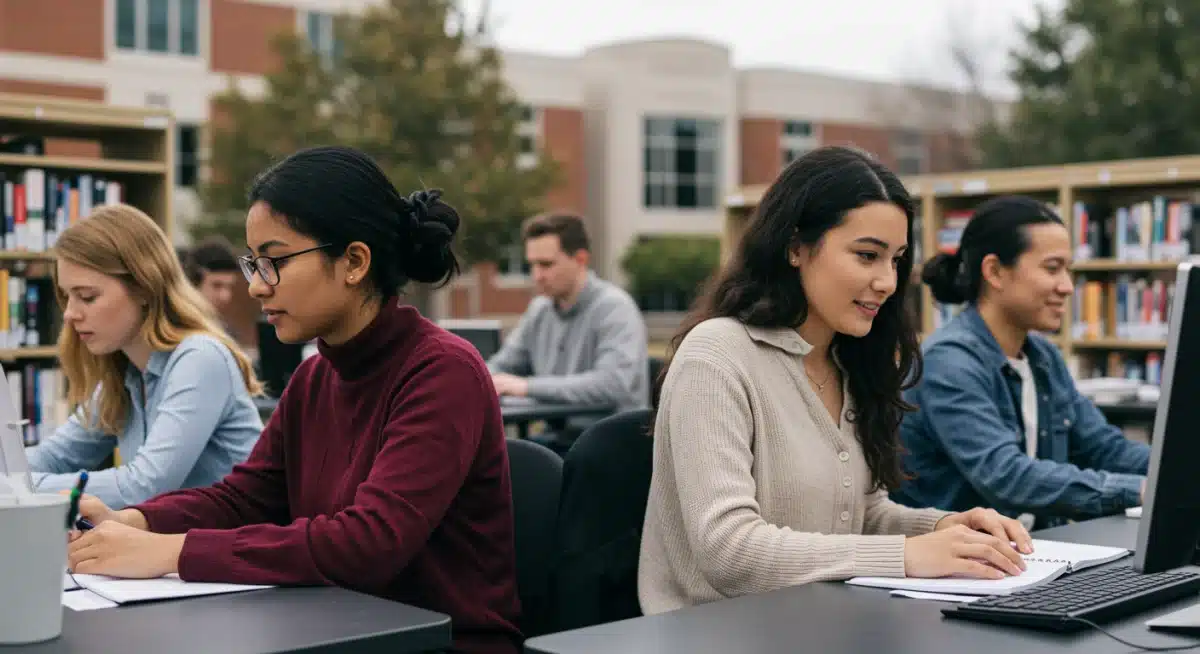Federal Work-Study Program: Boost Earnings 15% in 2025

The Federal Work-Study Program offers eligible students crucial financial aid through part-time employment, allowing them to earn money for educational expenses while gaining valuable work experience aligned with their studies or career goals.
Navigating the complexities of college finance can be daunting, but the Federal Work-Study Program: Maximizing Your Earning Potential by 15% in 2025 (Practical Solutions) offers a crucial lifeline for many students across the United States. This program not only provides vital income to offset educational costs but also integrates valuable work experience directly into your academic journey.
understanding the federal work-study program
The Federal Work-Study (FWS) program is a cornerstone of financial aid in the United States, designed to help students earn money to pay for their educational expenses. It provides part-time employment opportunities for undergraduate and graduate students with financial need, allowing them to work on campus or for approved off-campus non-profit organizations.
Participating in FWS can significantly reduce the burden of student loans and out-of-pocket expenses. The program emphasizes jobs that are relevant to your course of study, provide community service, or are otherwise in the public interest. This means you’re not just earning a paycheck; you’re also building valuable skills and experience that can benefit your future career.
eligibility requirements for FWS
To qualify for the Federal Work-Study program, students must meet specific criteria established by the U.S. Department of Education. These requirements ensure that the aid reaches those who need it most and are committed to their education.
- Financial Need: Demonstrated financial need, as determined by the Free Application for Federal Student Aid (FAFSA). Your school’s financial aid office calculates this based on your Expected Family Contribution (EFC) and the cost of attendance.
- Enrollment Status: Must be enrolled at least half-time in an eligible degree or certificate program.
- Satisfactory Academic Progress: Maintain satisfactory academic progress according to your institution’s policies, which typically includes a minimum GPA and completion rate.
Understanding these foundational requirements is the first step toward accessing this valuable financial resource. Many students overlook the FWS option, assuming they won’t qualify, but a thorough FAFSA submission is critical to determining eligibility.
how FWS differs from other financial aid
Unlike grants or scholarships, which are essentially free money, or student loans, which must be repaid, FWS funds are earned through employment. This distinction is important because it provides students with a sense of ownership over their financial contributions to their education.
The funds earned through FWS are paid directly to the student, typically bi-weekly, and can be used for any educational or living expenses. Furthermore, FWS earnings are exempt from federal income tax if they are used to pay for qualified education expenses. This makes FWS an attractive option for students seeking to minimize debt and gain practical experience simultaneously.
In essence, FWS offers a unique blend of financial support and professional development, setting it apart from other forms of student aid. It encourages self-sufficiency while providing a safety net for those with demonstrated financial need.
strategic job placement and skill development
Securing the right Federal Work-Study job is paramount to maximizing its benefits, both financially and professionally. It’s not merely about earning money; it’s about aligning your work with your academic and career aspirations to gain valuable, transferable skills.
Many universities offer a diverse range of FWS positions, from administrative roles to research assistantships and community service initiatives. The key is to be proactive in your job search and to view your FWS position as an integral part of your educational and professional development.
identifying high-value FWS positions
To truly maximize your earning potential and skill development, focus on FWS positions that offer more than just a paycheck. Look for roles that align with your major, provide opportunities for mentorship, or allow you to develop skills highly sought after in your chosen field.
- Departmental Roles: Positions within your academic department often provide direct exposure to your field, networking opportunities with faculty, and insight into research or administrative processes.
- Research Assistantships: If available, these roles can offer invaluable experience for students pursuing graduate studies or research-intensive careers, often involving data analysis, literature reviews, or lab work.
- Community Service: Many FWS programs support community engagement roles, which can be highly rewarding and develop leadership, communication, and problem-solving skills, especially for students interested in social work, public policy, or non-profit careers.
Don’t be afraid to ask questions during the application process about the nature of the work, the skills you’ll develop, and how the position might contribute to your long-term goals. A well-chosen FWS job can be a powerful resume builder.
leveraging FWS for career advancement
The experience gained through a Federal Work-Study position can be a significant asset on your resume and in job interviews. It demonstrates initiative, responsibility, and the ability to balance academic commitments with professional duties.
Actively seek feedback from your supervisors, take on new responsibilities, and document your accomplishments. These experiences provide concrete examples of your skills and work ethic, which are highly valued by future employers. Consider creating a professional portfolio of your work, if applicable, to showcase your capabilities.
Even seemingly entry-level FWS jobs can lead to unexpected opportunities. Many students have leveraged their FWS experience into internships, graduate school recommendations, or even full-time employment after graduation. The networking potential within your university and its affiliated organizations is immense.
maximizing earnings: practical solutions for 2025
To truly maximize your Federal Work-Study earnings in 2025, a proactive and informed approach is essential. This involves understanding your award, optimizing your hours, and exploring potential increases in your allocation.
Many students view FWS as a fixed amount, but there are often avenues to make the most of your award and even potentially increase it, particularly if your financial circumstances change.
understanding your FWS award and limits
Your Federal Work-Study award is not a lump sum but rather the maximum amount you can earn through the program during an academic year. It’s crucial to understand this limit and how your school structures FWS employment.
- Award Letter: Your financial aid award letter will specify your FWS allocation. Keep this in mind as you plan your work schedule.
- Hourly Wage: The hourly wage for FWS jobs must be at least the federal minimum wage, but many institutions pay more, especially for specialized roles.
- Work Schedule: Schools typically limit the number of hours students can work per week to ensure it doesn’t interfere with academic performance. This usually ranges from 10-20 hours per week during the academic year.
Knowing these details allows you to calculate how many hours you need to work to earn your full award and to plan your schedule accordingly. Don’t leave money on the table by not working enough hours to meet your full award.
strategies for increasing your FWS allocation
While your initial FWS award is based on your FAFSA, certain circumstances might allow for an increase. It’s always worth discussing these possibilities with your financial aid office.


Life circumstances can change, impacting your financial need. If you or your family experience a significant financial change after submitting your FAFSA, such as job loss, medical expenses, or a decrease in income, you can request a “professional judgment review” from your financial aid office. This review allows them to re-evaluate your eligibility and potentially increase your FWS award or other forms of aid.
Additionally, some schools may have unused FWS funds later in the academic year. If you’ve exhausted your initial award or weren’t initially offered FWS, inquire with your financial aid office about the availability of additional funds. Persistence and clear communication are key.
optimizing work hours and pay rates
Once you have a FWS job, actively manage your hours to ensure you reach your maximum award. Communicate regularly with your supervisor about your schedule and any flexibility they might offer. Some positions may allow for additional hours during breaks or less intensive academic periods.
If your school offers different pay rates for various FWS positions, consider if a higher-paying role aligns with your skills and schedule. Sometimes, a slightly more demanding job can significantly boost your overall earnings within the same award limit. Always weigh the financial benefit against the potential impact on your academic performance.
navigating the application process for 2025
Successfully applying for the Federal Work-Study Program in 2025 requires attention to detail and timely action. Understanding each step ensures you don’t miss out on this valuable opportunity.
The process begins with federal forms and extends to campus-specific procedures, all designed to identify eligible students and match them with suitable employment.
the role of FAFSA in FWS eligibility
The Free Application for Federal Student Aid (FAFSA) is the gateway to all federal financial aid, including the Federal Work-Study Program. Submitting your FAFSA accurately and on time is the single most important step.
- Early Submission: File your FAFSA as soon as it becomes available (typically October 1st for the following academic year). Many financial aid programs, including FWS, operate on a first-come, first-served basis due to limited funding.
- Accuracy: Ensure all financial information is correct to avoid delays or miscalculations of your financial need.
- Indicate Interest: On the FAFSA, there’s a question asking if you’re interested in Federal Work-Study. Always answer “yes” to be considered for the program.
Your FAFSA data is used by your school’s financial aid office to determine your Expected Family Contribution (EFC) and, subsequently, your eligibility for various aid programs, including FWS.
campus specific application procedures
Once your FAFSA is processed and your financial aid package, including FWS, is determined, each institution will have its own procedures for students to apply for specific FWS jobs. This typically involves an internal job board or a dedicated work-study coordinator.
Familiarize yourself with your school’s financial aid website and career services portal. They will often list available FWS positions, application deadlines, and contact information for supervisors. Don’t wait until the last minute; popular jobs fill up quickly.
Prepare a professional resume and cover letter, even for entry-level FWS positions. This demonstrates your seriousness and professionalism, setting you apart from other applicants. Treat it like a real job application, because it is.
balancing work-study with academic demands
Successfully participating in the Federal Work-Study program while maintaining strong academic performance requires effective time management and a clear understanding of your limits. The goal is to enhance your education, not detract from it.
Many students find that FWS provides a beneficial structure to their week, encouraging better organization and discipline. However, it’s crucial to strike the right balance.
time management strategies for FWS students
Juggling classes, homework, social life, and a work-study job demands excellent time management skills. Develop a schedule that allocates specific times for each activity and stick to it as much as possible.
- Prioritize Academics: Your studies should always come first. If you find your FWS job interfering with your coursework, speak to your supervisor and financial aid office about adjusting your hours.
- Use a Planner: Whether digital or physical, a planner helps you keep track of deadlines, work shifts, and study blocks.
- Communicate: Be open with your FWS supervisor about your academic schedule and any periods of high academic stress (e.g., midterms, finals). Most supervisors are understanding and willing to work with you.
Effective time management not only helps you succeed academically but also demonstrates responsibility, a highly valued trait in any work environment.
avoiding burnout and academic decline
The pressure to earn money can sometimes lead students to overcommit, risking burnout and a decline in academic performance. Recognize the signs of stress and take proactive steps to prevent them.
It’s important to understand that your FWS award is a maximum, not a requirement. If working the full allocated hours proves too much, it’s okay to work fewer. Your academic success is the primary goal of being in college. Don’t hesitate to seek support from campus resources like academic advising, counseling services, or the financial aid office if you’re struggling.
Remember, the FWS program is designed to support your education, not hinder it. Finding a sustainable balance is key to long-term success and well-being.
long-term benefits and post-graduation prospects
The Federal Work-Study Program offers benefits that extend far beyond simply earning money for college. It provides a foundation for future career success, skill development, and professional networking.
The practical experience gained can be a significant differentiator in a competitive job market, giving FWS participants a tangible advantage over peers who may not have similar work histories.
building a strong resume with FWS experience
Employers highly value candidates with practical work experience, and your FWS position counts. Even if the job isn’t directly related to your major, the transferable skills you acquire are invaluable.
- Highlight Skills: Emphasize skills like time management, communication, problem-solving, teamwork, and responsibility on your resume.
- Quantify Achievements: Whenever possible, quantify your contributions. For example, “Organized and cataloged over 500 library resources” or “Assisted in processing financial aid applications for 200+ students.”
- Professional References: Your FWS supervisor can be an excellent professional reference, attesting to your work ethic and capabilities.
Think strategically about how to present your FWS experience to showcase its relevance to your career goals. It’s more than just a part-time job; it’s a stepping stone.
networking and mentorship opportunities
FWS jobs often place you in close proximity to faculty, staff, and other professionals within your university or community. This creates natural opportunities for networking and mentorship.
Building relationships with supervisors and colleagues can lead to recommendations, introductions to industry contacts, and valuable career advice. These connections can be instrumental in securing internships, graduate school placements, or even your first job after graduation.
Don’t underestimate the power of these relationships. A strong professional network is a critical asset throughout your career, and FWS provides an early opportunity to start building it.
future outlook for federal work-study in 2025
As we look towards 2025, the Federal Work-Study Program continues to evolve, with ongoing discussions about its funding, structure, and impact. While specific changes are always subject to legislative processes, the program’s core mission remains steadfast: to support students with financial need through earned income and valuable experience.
Staying informed about potential policy shifts and advocating for continued investment in student aid programs are crucial for current and future FWS participants.
anticipated changes and policy discussions
The landscape of federal financial aid is dynamic. In recent years, there have been discussions about reforming the FAFSA, simplifying aid processes, and potentially expanding funding for programs like FWS. While concrete changes for 2025 are yet to be fully determined, students should be aware of these ongoing conversations.
Potential reforms could include changes to how financial need is assessed, adjustments to award limits, or new initiatives to encourage specific types of work-study placements, such as those focused on STEM fields or community development. Staying connected with your school’s financial aid office and reputable financial aid news sources will keep you updated.
advocacy for student aid programs
The continued strength and availability of programs like Federal Work-Study depend, in part, on advocacy from students, educators, and institutions. Understanding the importance of these programs and communicating their impact can influence policy decisions.
Engage with student government, participate in campus discussions about financial aid, and consider writing to your elected officials about the value of FWS. Collective voices can make a difference in ensuring these vital resources remain accessible for future generations of students.
The Federal Work-Study Program is more than just a paycheck; it’s an investment in a student’s future, fostering independence, professional growth, and academic success. Its enduring value makes it a program worth understanding, maximizing, and supporting.
| Key Point | Brief Description |
|---|---|
| FWS Eligibility | Requires demonstrated financial need via FAFSA, half-time enrollment, and satisfactory academic progress. |
| Maximizing Earnings | Proactively seek high-value positions, understand award limits, and inquire about professional judgment reviews for increases. |
| Skill Development | Choose roles aligning with career goals to gain transferable skills and professional experience for your resume. |
| Application Process | Complete FAFSA early and accurately, then follow campus-specific procedures for job applications. |
frequently asked questions about federal work-study
The Federal Work-Study (FWS) Program is a federal financial aid initiative that provides part-time jobs for undergraduate and graduate students with financial need. It allows students to earn money to help pay for educational expenses while gaining valuable work experience, often in fields related to their studies or community service.
To apply, you must first complete the Free Application for Federal Student Aid (FAFSA) and indicate your interest in work-study. Your school’s financial aid office will then determine your eligibility and include FWS in your financial aid package. You’ll then apply for specific FWS jobs through your institution’s career services or departmental listings.
Your FWS award is the maximum you can earn. While you cannot exceed this amount, if your financial circumstances change significantly after submitting your FAFSA, you can request a “professional judgment review” from your financial aid office, which might lead to an increased award. Unused funds may also become available later in the year.
FWS jobs vary widely but often include administrative support, library assistants, lab assistants, tutors, and community service roles. Many positions are on campus, but some are with approved non-profit organizations off campus. The program encourages jobs related to your major or that provide valuable public service.
FWS provides essential work experience, allowing you to develop transferable skills like time management, communication, and problem-solving. This experience strengthens your resume, provides professional references, and can lead to networking opportunities that are invaluable for securing internships, graduate school admissions, or your first post-college job.
conclusion
The Federal Work-Study program stands as a vital resource for students seeking to manage college costs while building a strong foundation for their professional future. By understanding its mechanisms, strategically selecting work opportunities, and actively managing your participation, you can significantly enhance your earning potential and gain invaluable experience. For 2025 and beyond, embracing FWS as more than just a job, but as an integral part of your educational and career development, is a practical solution for navigating the financial landscape of higher education with confidence.





